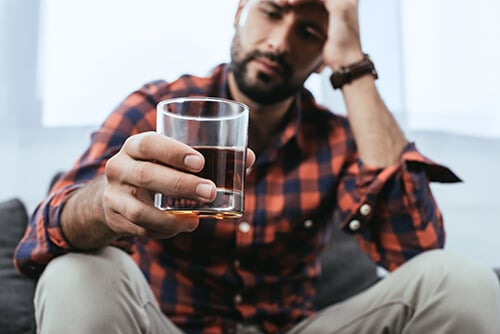Addiction Treatment
What are Common Alcohol Withdrawal Symptoms?

Written By:

Table of Contents
To overcome an addiction to alcohol, clients will need a detox. This process means ending the consumption of alcohol, and it leads to withdrawal symptoms. While this can be an unpleasant experience, the right medical support can make a big difference. Alcohol withdrawal is nothing to be taken lightly. There are a number of health risks that come with the process.
Alcohol withdrawal can begin just a few short hours after your last dose. Most detox programs take about a week to complete. Alcohol is dead to have some of the most intense side effects during withdrawal. Take a look at some specific alcohol withdrawal symptoms as well as what to expect once the detox is over.
Rapid Heart Rate
Roughly 24 hours into an alcohol detox program, alcohol withdrawal symptoms begin to worsen. For many clients, this means that specific functions of the body are sped up. It is very common to see a rapid heart rate, which makes it hard to relax or stay calm for extended periods of time.
It is also common to see an increase in blood pressure. Body temperature may also rise, making clients uncomfortably warm. Fortunately, these side effects will not last long. They tend to last for less than a week, and often they taper off in even less time.
Abdominal Discomfort
Some of the most common withdrawal symptoms involve the digestive system. Trying to adjust to functioning without alcohol is challenging for much of the body. For many clients, this means abdominal discomfort in all its varying forms.
Some clients will struggle with diarrhea or abdominal cramping. Others may feel nauseous. Most people in alcohol withdrawal will not have much of an appetite, and even drinking sips of water can be harsh. In many ways, alcohol withdrawal can feel like having a severe case of the flu.
Sweating and Dehydration
Alcohol withdrawal symptoms can include diarrhea, vomiting, reduced thirst, and an increase in sweat thanks to high body temperature. It does not take an expert to see that all of these withdrawal symptoms will combine to lead to dehydration.
Dehydration can be mild, but it could also potentially be severe. When clients struggle with acute dehydration, they need immediate medical attention. Electrolyte beverages are one option, but in severe cases, an IV saline solution is the best course of action.
Hallucinations
One of the most frightening symptoms of alcohol withdrawal is hallucinations. Clients in the peak of alcohol withdrawal may hear or see things that are not there. Both visual and auditory hallucinations can be traumatic, and some clients react violently.
Fortunately, this is a rare withdrawal symptom. Nonetheless, it is a possibility for those overcoming alcohol abuse and addiction, and it is just one more reason why medical support is necessary throughout the process.
What Happens Once the Alcohol Withdrawal Symptoms End?
The end of withdrawal does not mean the end of recovery. At The Last Resort Recovery, clients continue their journey to sobriety with residential or outpatient rehab as well as an aftercare program. Some of the many practical treatment modalities available include:
- Medical detox program
- Family addiction treatment program
- Chronic pain recovery program
- Cognitive-behavioral therapy
- Dialectical behavioral therapy
- Alcohol addiction treatment
Overcoming alcohol withdrawal symptoms is the first step to sobriety. At The Last Resort Recovery clients can choose from detox services, residential programs, and an intensive outpatient program. Call us today to learn more about creating a custom treatment plan for addiction recovery. Addiction does not have to control your life forever. Reach out for help today and start on the road to recovery before it is too late.
